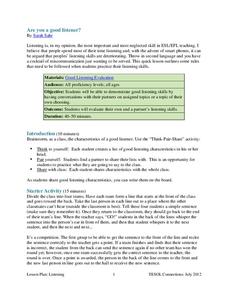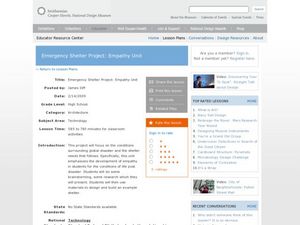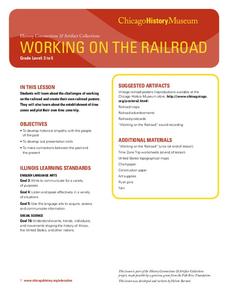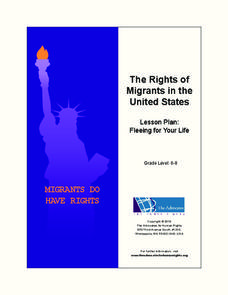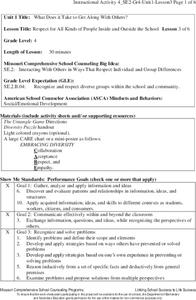Anti-Defamation League
Dealing with the Social Pressures that Promote Online Cruelty
Why do people engage in cyberbullying? What can be done about it? These are the questions middle schoolers consider in a very timely lesson. Participants view PSA announcements, read a case study, and participate in scenarios designed to...
Teaching Tolerance
Participating in Digital Communities
It's possible to promote inclusion and empathy on the Internet—it just takes effort! Scholars read and discuss a short story about being a friend online. Then, pupils role-play appropriate ways to respond to hate within a digital...
Daughters of the American Revolution
Lesson 2: How Do We Determine the Value of Education?
Have women always had the same educational opportunities as their male counterparts? Young historians read an 1819 essay by Emma Willard on the state of female education in the 19th century before discussing their views regarding women's...
TESOL
Are You a Good Listener?
Your learners talk to each other every day, but are they really listening? Use a lesson based on listening skills to ensure that class members feel heard and respected. It includes games, discussion topics, and self-assessment tools that...
National Endowment for the Humanities
“The Great Migration” by Minnie Bruce Pratt
Minnie Bruce Pratt's poem, "The Great Migration," offers young scholars an opportunity to reflect on how where we come from influences who we are. Groups conduct a close reading of the poem, recording observations about the poem's...
Curated OER
Alexander and the Terrible, Horrible, No-Good, Very Bad Day
Second graders interact with the story of Alexander's horrible day by connecting it to their lives. They practice predicting, writing paragraphs, reading aloud, discussing his problems, making a card to cheer him up, and designing a pair...
Nemours KidsHealth
Empathy: Grades K-2
Second graders read articles about being afraid, dealing with anger and apologizing. In this feelings lesson, 2nd graders read articles and discuss the feelings they have. Young scholars describe their feelings and how to be supportive...
Curated OER
Emergency Shelter Project: Empathy Unit
Pupils design emergency shelters. In this designing emergency shelters lesson, students discuss living conditions of people after a natural disaster. Pupils discuss the tsunami that struck East Asia. Students design collapsible...
Curated OER
Working on the Railroad
Students plan a trip on the railroad. In this railroad creation and implementation lesson, students listen to the song "Working on the Railroad", make a map of where the track was laid and discuss the geographical challenges. Students...
US Institute of Peace
Becoming a Peacebuilder
"Be the change you wish to see in the world!" The 15th and final lesson in a peacebuilding series uses this quote from Gandhi to prepare pupils for their own action projects. Individuals research a global issue, then brainstorm a method...
Teaching Tolerance
Understanding the Prison Label
Break the chain. An engaging lesson examines why it is so hard to break free of the prison system in the US. Academics participate in a reader's theater, read primary sources, and discuss their thoughts. The lesson explains the hardships...
Overcoming Obstacles
Resolving Conflicts
A activity about resolving conflicts guides young scholars through the process of identifying emotions and reflecting on the situation, all before taking action. The activity encourages class members to stay open-minded and listen to the...
Curated OER
Empathy/Fairness
Students explore empathy and fairness. They examine the importance of being able to empathize with people who are different from themselves. Students explore ways of resolving conflict and they recognize the concerns of others.
Curated OER
100 Questions
Students practice problem solving skills by asking questions and participating in a design challenge. In this asking questions lesson, students work in pairs to ask questions to design a solution for a difficult personal problem....
Curated OER
Teach Peace Now
Help your learners discover empathy and understanding by investigating two sides of a situation. In this humanities lesson, pupils examine different pairs of shoes and hypothesize about who may have worn them. Discuss real life...
Health Smart Virginia
Social Emotional Skills
A list of activity ideas, lessons, and resource links all focus on kindness, empathy, and mindfulness. Five steps offer experience in role-play, crafts, writing, thoughtful discussions, and more!
Advocates for Human Rights
The Rights of Migrants in the United States Lesson Plan: Fleeing for Your Life
A role-playing scenario has middle-schoolers imagining that they are refugees forced to flee their community and integrate into a new one. Then, some play the roles of members of the new community and the class brainstorms ideas about...
Partners Against Hate
Building Community and Combating Hate
Put a little love in your classroom! Help middle school scholars understand differences among people and build a sense of community within their school through 10 well-organized lessons. Each unique lesson incorporates writing,...
Museum of Disability
Don't Call Me Special
Introduce young learners to the idea of disabilities and making friends with children who are different than they are. Using Don't Call Me Special - A First Look at Disability by Pat Thomas, learners are guided through the new vocabulary...
Health Smart Virginia
Relationship Skills and Communication
Relationship and communication skills are the heart of a lesson that focuses on passive, aggressive, and assertive communication. After examining examples of each type, teams develop an assertive, win/win solution that resolves a conflict.
Facing History and Ourselves
Protesting Discrimination in Bristol
Using the Bristol Bus Boycott as a case study, class members examine the strategies and levels of power protesters used to effect change. The two-day lesson concludes with individuals reflecting on the actions they might take in face of...
Western Justice Center
Underlying Needs
Conflicts arise when underlying needs are unmet. An engaging video introduces viewers to nine basic human needs. Then, through a series of videos, worksheets, and activities, class members learn that by focusing on interests and needs,...
Museum of Disability
Stand in My Shoes
Stand in My Shoes, a story by Bob Sornson, is an effective way to teach young learners about empathy and making friends. Once pupils read through the story, they answer a series of discussion questions and complete reading activities...
Missouri Department of Elementary
Respect for All Kinds of People Inside and Outside the School
Why is it important to embrace diversity? Scholars explore the topic by learning about the CARE acronym: Collaboration, Acceptance, Respect, Empathy. They also complete a diversity puzzle worksheet and play a collaborative game that...





